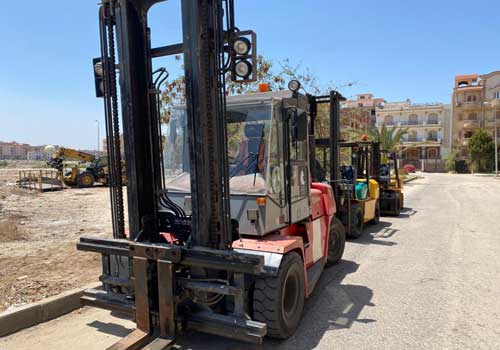
renting heavy equipment in Egypt can be facilitated through various companies that specialize in equipment rental services.
Here are some general steps you can take to find and rent heavy equipment in Egypt:
For renting heavy equipment in Egypt
Here are some methods to help you in your research:
Online Search Engines: For renting heavy equipment in Egypt use popular search engines like Google to search for heavy equipment rental companies in Egypt.
Business Directories: Explore online business directories that list companies by category.
Industry Associations: Contact industry associations related to construction, infrastructure, or heavy equipment in Egypt.
Trade Shows and Conferences: Attend construction-related trade shows, conferences, or exhibitions.
Local Contacts and Networking: Reach out to local contractors, builders, or construction professionals.
Online Marketplaces: Websites like MachineryTrader, RentalYard, or local platforms might have listings for equipment available in Egypt.
Government or Municipal Websites: Check government or municipal websites for business directories or lists of licensed companies.
Customer Reviews and Testimonials: Look for customer reviews on online platforms, forums, or the company’s website. Reviews can provide insights into the experiences of other customers with a particular rental company.
For renting heavy equipment in Egypt Check Reviews and Reputation
Here are some methods to assess the reviews and reputation of potential rental companies in Egypt:
Online Review Platforms: Customers often share their experiences, providing valuable insights into a company’s service quality.
Company Websites: Visit the official websites of the rental companies you are considering.
Social Media: Search for the rental companies on social media platforms like Facebook, Twitter, or LinkedIn.
Industry Forums and Blogs: Explore industry-specific forums or blogs where professionals discuss their experiences with equipment rental companies.
Ask for References: Reputable companies should be willing to provide references from previous clients who can speak about their experiences.
Local Business Associations: Check with local business associations or chambers of commerce.
Check the Better Business Bureau (BBB): The BBB often provides information on how well a business responds to customer complaints.
Online Search for News or Complaints: Perform a broader online search using the company’s name along with terms like “complaints” or “news.”
Ask for Recommendations: Seek recommendations from colleagues, industry peers, or other businesses that have experience with heavy equipment rentals in Egypt.
Evaluate Response to Negative Reviews: A company that addresses concerns and works towards resolutions may demonstrate a commitment to customer satisfaction.
Check for Certifications and Awards: Look for any certifications or awards that the rental company has received.
Read reviews and check the reputation of the rental companies you are considering.
Visit Company Websites to renting heavy equipment in Egypt
Here’s a guide on what to look for when visiting company websites:
Home Page: Start by navigating to the company’s homepage. This section often provides a general overview of the company, its services, and its commitment to quality.
About Us Section: Read the “About Us” section to understand the company’s history, mission, and values.
Services and Equipment: Look for a section detailing the services offered, especially information about the types of heavy equipment available for rent.
Gallery or Projects: Check for a gallery or section showcasing the company’s past projects. This can give you an idea of the scale and types of projects they have been involved in, demonstrating their experience and expertise.
Contact Information: Ensure that the website provides accurate and up-to-date contact information, including a physical address, phone number, and email address.
Customer Testimonials: Look for a section with customer testimonials or case studies. Real-life experiences from previous clients can provide valuable insights into the company’s reliability and the quality of their equipment and services.
Rental Terms and Conditions: Check for information on rental terms and conditions. This may include details on rental durations, rates, payment terms, and any additional fees or charges.
Safety and Compliance: Confirm that the company adheres to safety standards and complies with relevant regulations.
Insurance Options: Determine if the company offers insurance options for the rented equipment.
Contact the Company: Use the provided contact information to reach out to the company with any specific questions or requests for additional information.
By thoroughly exploring a company’s website, you can gather valuable information to make an informed decision about whether they are a suitable partner for your heavy equipment rental needs.
Contact Rental Companies in order to renting heavy equipment in Egypt
Here’s a guide on how to contact rental companies:
Collect Contact Information: Ensure you have the correct and up-to-date contact information for each company.
Prepare a List of Questions: Before reaching out, prepare a list of questions you want to ask each rental company.
Phone Call: Consider making an initial phone call to the rental company. This allows for direct communication and the opportunity to ask immediate questions.
Email Inquiry: Send a detailed email outlining your specific requirements. Provide information about the type of equipment you need, the expected duration of the rental, and any special features or requirements.
Online Contact Forms: Many companies have online contact forms on their websites. Fill out these forms with your contact details and a brief message about your equipment rental needs.
Request a Quote: If applicable, request a formal quote for the equipment and services you need. This should include a breakdown of rental rates, any additional fees, and the overall cost.
Discuss Rental Terms: During your communication, make sure to discuss rental terms such as the duration of the rental, payment schedules, delivery and pickup logistics, and any specific conditions outlined in the rental agreement.
Ask about Equipment Condition: Ask about maintenance schedules, recent inspections, and any guarantees regarding the performance and reliability of the equipment.
Insurance Requirements: If the company doesn’t provide information about insurance coverage in their initial communication, ask about insurance options and requirements.
Verify Additional Services: Check if the company offers additional services such as equipment operators, maintenance support, or on-site assistance.
Negotiate Terms if Necessary: If the initial terms provided don’t fully align with your needs, discuss the possibility of negotiating terms.
Confirm Contact Information: Double-check and confirm the contact information for future reference. This includes the names and direct contact details of individuals you are communicating with at the rental company.
Verify Equipment Condition
Here are steps to ensure the equipment is in good condition:
Inspection at the Rental Facility: Whenever possible, visit the rental company’s facility for renting heavy equipment in Egypt to physically inspect the equipment you intend to rent. This allows you to assess the overall condition, cleanliness, and functionality of the equipment.
Ask for Inspection Records: This documentation can provide insights into the equipment’s history, including any recent repairs or maintenance.
Request Recent Photos: If visiting the rental facility is not feasible, ask the rental company to provide recent, detailed photos of the equipment.
Check for Visible Wear and Tear: Pay attention to components such as tires, tracks, hydraulic systems, and any attachments. Check for leaks, rust, or other visible damage.
Verify Functionality: Ensure that all essential functions of the equipment are in good working order. This includes testing controls, hydraulics, electrical systems, and any specialized features relevant to your project.
Engine and Powertrain: Check for unusual noises, vibrations, or smoke during operation.
Test Safety Features: Confirm that all safety features, such as lights, alarms, and emergency shut-off mechanisms, are functioning properly.
Ask About Recent Inspections: Inquire about any recent inspections the equipment has undergone.
Discuss Maintenance Policies: Clarify the rental company’s maintenance policies.
Ask for a Demonstration: If possible, ask the rental company to provide a demonstration of the equipment’s operation.
Document Existing Damage: Take note of any existing damage or wear that you observe during the inspection.
Include Condition in the Rental Agreement: Ensure that the condition of the equipment is clearly documented in the rental agreement.
You can also read: What is lifting equipment in construction
Understand Rental Terms
Here are key aspects to consider when reviewing and comprehending rental terms:
Rental Duration: For renting heavy equipment in Egypt, clearly understand the agreed-upon rental duration. Whether it’s a daily, weekly, or monthly rental, ensure that it aligns with your project timeline.
Rates and Fees: This includes the base rental rate, delivery and pickup charges, and any additional fees for fuel, maintenance, or insurance.
Payment Terms: Understand the payment terms, including when payments are due and the accepted payment methods.
Deposit Requirements: Inquire about any deposit requirements.
Insurance Coverage: Determine whether it covers damage, theft, or other potential risks. If necessary, inquire about additional insurance options.
Maintenance Responsibilities: Determine your responsibilities regarding equipment maintenance.
Delivery and Pickup Logistics: Confirm who is responsible for transportation, associated costs, and the timeframe for these services.
Equipment Condition at Delivery: Note any existing damage or wear to avoid disputes when returning the equipment.
Usage Limits: Be aware of any usage limits outlined in the rental agreement. Exceeding specified usage limits may result in additional charges.
Fuel Policies: Some rental companies provide equipment with a full tank and require it to be returned in the same condition, while others may charge for fuel separately.
Termination Clause: Review the termination clause.
Operator Requirements: If the equipment requires specialized operators, clarify whether the rental company provides operators or if you need to arrange for qualified personnel.
Safety and Compliance: Ensure that the rental terms include adherence to safety regulations and compliance with relevant laws.
Return Conditions: Understand the requirements for returning the equipment.
Dispute Resolution: Familiarize yourself with the dispute resolution mechanisms outlined in the rental agreement.
Insurance Coverage
Here are key considerations regarding insurance coverage for rented equipment:
Rental Company’s Insurance:
Inquire about the insurance coverage provided by the rental company.
Coverage Limits:
The limits of the renting heavy equipment in Egypt insurance coverage provided includes the maximum amount the insurance will pay in the event of damage, theft, or other covered incidents.
Additional Insurance Options: Some companies provide supplementary coverage that goes beyond the basic insurance included in the rental agreement. Evaluate these options based on your specific needs and the level of risk associated with your project.
Liability Coverage: Clarify the extent of liability coverage included in the insurance.
Delivery and Pickup
Here are key considerations and steps to ensure a smooth logistics process:
Discuss Logistics Early: renting heavy equipment in Egypt, start discussing the logistics of delivery and pickup early in the rental process.
Provide Project Details: Share detailed information about your project site, including the location, accessibility, and any specific conditions that might impact the delivery or pickup process.
Verify Delivery Addresses: Double-check and confirm the delivery and pickup addresses. Accurate location information is essential to ensure that the equipment reaches the correct site without delays.
Delivery and Pickup Dates: Agree on specific dates and times for both the delivery and pickup of the equipment.
Payment and Contracts
Here’s a guide on managing payment and contracts:
Contracts: Review the Contract Thoroughly. Understand the terms, conditions, responsibilities, and any potential fees or penalties.
Clarify Terms: Ensure that all terms align with your expectations.
Document Responsibilities: Clearly document the responsibilities of both parties in the contract.
Include Equipment Details: Ensure that the contract includes detailed information about the rented equipment, including make, model, serial number, and any specific features or accessories.
Specify Rental Duration: Clearly state the agreed-upon rental duration in the contract.
Outline Rental Rates: Include details about how the rates are calculated (daily, weekly, monthly) and whether there are any additional charges for overtime use.
Always ensure compliance with local regulations and safety standards when renting heavy equipment. It’s also advisable to plan ahead and make reservations in advance, especially during peak construction seasons, when demand for heavy equipment rental may be high.
The variety of CLC provided services between technicality and consultation makes it easy for our clients to plan for their projects.


